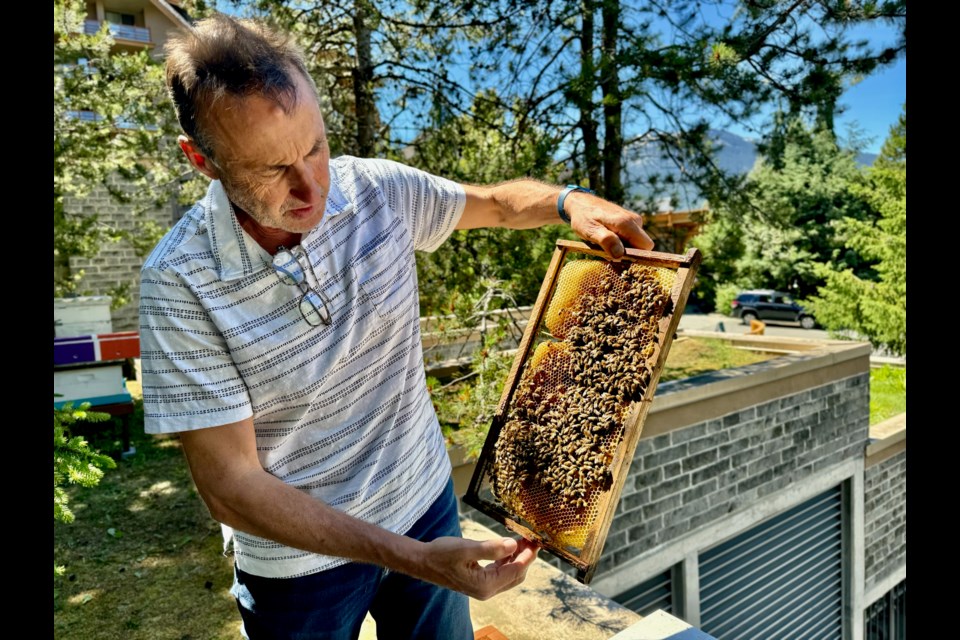On a well-shaded garden at the Four Seasons Resort Whistler, beekeeper Iain Glass is preparing to welcome and educate the public about beekeeping.
Glass is the executive director for Ensure Hive Future, a federal non-profit starting beehive excursions in Whistler.
Beekeeping experience
“Our mandate is apiary research and education," Glass said. "So, we basically raise bees, and a byproduct of that is we have honey, and we love educating people."
Seven days a week, people can book hive visits on Ensure’s website for tours at the Four Seasons or Nita Lake Lodge. A third beehive site sits atop the Fairmont Chateau Whistler.
Young kids and their caregivers, international visitors, or anyone buzzing to learn can now experience local honey production and the incredible creatures that work hard for the sweet stuff.
The program includes suiting up for an educational tour of the hives, and visitors learn about basic bee types and facts while getting hands-on with bees as they do their work.
They’ll also learn how to process honey and jar some liquid gold to take home.
The idea started when customers at farmers' markets wanted to attend a full-day beekeeping course, but most interest stemmed from kids ages five to 11. A full-day lecture is hard enough for an adult, let alone kids, so Ensure created kids programming. The response from parents was so powerful, it sparked an idea for a fully-fledged business.
“They basically said it was a life-altering experience for their child, that their child became so much more engaged in awareness of the things around them and looking for native bees," Glass said. "And because the child had done it with the parent, the communication between the child and parents also was this benefit."
Bee science
The bees Ensure raises are selected and bred to resist varroa destructor, a parasitic mite that can attack adult bees and their young. Varroa lay eggs in a hive and feed on bee larvae, deforming their wings and bodies.
Ensure partners with Ethical Bees, a commercial apiary in the U.S. that has access to the United States Department of Agriculture’s (USDA) genetics technology. They artificially inseminate queen bees with stock selected for their natural resistance to varroa mites, basing their work from peer-reviewed science out of the USDA Agricultural Research Bee Lab.
Bees, like humans, can adapt to pathogens over time. Glass said a honeybee hive can adapt to varroa mites after eight and a half generations, which leads to certain stock having a natural resistance. By only breeding honeybees that are already resistant, he doesn’t need to treat them for the mites or wait generations.
But Glass said not all beekeepers agree with the approach he takes, thinking it’s too “tough love.”
“Basic animal husbandry is being forgotten about and people are doing everything they can to keep their bees alive rather than going ‘wait a second, there's a thing called Darwin, and we need to actually work on better bees,’” he said.
Better bees are a way to ensure their survival, with headlines about bee deaths making their way into media over the last few years.
While varroa mites can decimate apiaries, Glass attributes much of bee decline to monoculture, pesticides and climate change.
“Our modern farming has lost diversity, so their food sources have been limited,” he said.
Then, there’s pesticides, which may not kill bees, but severely injure them. Glass offers a parallel to Big Tobacco’s strategy of denying and shifting messages about the harm from pesticides.
“Billions of dollars was spent by Big Tobacco when they knew that cigarettes were causing cancer to suppress that data," he said. "The way that the pesticide companies push their agenda about the pesticide was defending the idea that you couldn't farm productively without it, which is not really true.”
The environmental changes from urban sprawl and monoculture deprives bees of a diverse food source, which in turn leads to their decline, which makes agriculture less productive.
Commercial beekeepers now make a large chunk of their income from transporting bees hundreds or thousands of kilometres to pollinate outside their local climate, with Glass citing California almond farms as just one example.
“The honeybee has become like a temporary foreign worker of doing the pollination that's required because we don't have as many native bees as we should anymore,” he said.
Canada imports bees from other provinces and countries, a practice which disorients bees acclimated to their home. Transporting a bee just 200 kilometres means the diet they have adapted to changes, which means they might not store enough nectar and pollen for winter, and they can starve.
Glass wants to counter this trend through education and encouraging grassroots backyard beekeeping.
“If you can learn to manage your bees, we can work with you to understand better genetics,” he said.
Honey coming to a hotel near you
Just as bees have a symbiotic relationship to plants, the hive locations have symbiotic relationships with the culinary teams at the Fairmont, Nita Lake Lodge and the Four Seasons.
Food and drink menu design is on the go, incorporating the liquid gold into carefully curated culinary experiences. Just as fruits and vegetables have their own seasons and flavour profiles, so too does honey, with early harvests producing a rich, dark palate and later-season honeys reflecting lighter golden hues.
“It’s absolutely delightful for us to be working with culinary at all three restaurants,” Glass said, noting the different locations produce boutique harvests for cooking.
“We're hardwired as humans for salt, sweet, fat … It's just in our DNA. I think it's fun to see one of the first forms of sugar that mankind knew about—the sweet taste of honey.”
Visitors should appreciate the delectable flavour even more when they learn that a single bee lives for about 44 days and only produces close to one tenth of a teaspoon of honey in that time. One pound of honey represents 55 thousand months of bee travel, according to Glass—an incredible amount of work.




